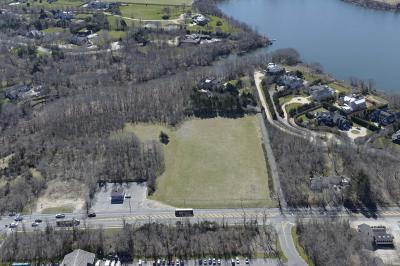Relief, Dismay as Bridgehampton Gateway Plan Withdrawn

Meeting on Tuesday night, the Southampton Town Board withdrew a town-initiated application on the Bridgehampton Gateway project, a mixed-use planned development district that drew concerns from community groups. Separately, members enacted a moratorium on any new P.D.D.s while they review the controversial code that essentially allows the town to amend zoning if a project offers a community benefit.
“What a difference a few weeks makes,” Supervisor Jay Schneiderman said of what he called “a dramatic turn of events” since the last public hearing on the project, located across from the Bridgehampton Commons, in early May. In a letter to the board dated May 19, Carol Konner, the principal owner of the Montauk Highway properties that the town wanted to rezone from highway business to a mix of commercial, retail, and residential, withdrew her support for the plan.
Mrs. Konner and her son Gregg Konner had been cooperative after the town revived plans for a P.D.D. three years ago, even though she had plans underway to build an Equinox gym, an allowable use under the current highway business zoning. Her lawyer, Anthony B. Tohill, said his client had a contractual obligation to move forward with that project.
“I can’t see doing anything with it without a willing property owner,” Mr. Schneiderman said at the start of Tuesday’s meeting.
The P.D.D. proposal would have allowed for a commercial complex of 80,000 square feet with 20 affordable apartments, mostly one-bedroom, set above commercial uses such as an Equinox. Four market-rate condos would be built in the back of the property, away from the highway.
Despite early support, the Bridgehampton Citizens Advisory Committee voted against the project late last month. While it had strong opposition, it also had support, particularly for the affordable housing component.
Kevin McAllister of Defend H20 spoke in support Tuesday night of the project’s $2.4 million state-of-the-art sewage treatment plant proposed by Mrs. Konner, who said she would allow neighboring houses to hook into it at no charge as long as they paid the hook-up fee. “I was very pleased to see that wastewater was going to be addressed to the highest achievable levels employing a system that gets down to single digits,” he said. If the properties are developed under the current zoning, he worried that the system would be deficient, because of the county’s management of sewage. “Kellis Pond is an important watershed, like every other one,” he said. “Let’s be real about what the implications are to various water bodies.”
Mr. Schneiderman said he had raised an interesting point, since the sewage treatment facility Mrs. Konner was willing to install went beyond county requirements, and it was unclear whether the town would be able to require a sewage treatment facility at all at Equinox.
“That’s the thousand-dollar question,” Mr. McAllister said.
“This is a mixed bag,” the supervisor said. “In one way, I’m thrilled to have off my plate a controversial proposal. But there were some interesting aspects, including the state-of-the-art sewage treatment.”
“The old adage, be careful what you wish for,” Mr. McAllister continued. “I think it’s appropriate here. There’s a great deal of uncertainty and potentially further degradation to Kellis Pond because of the inability to perhaps control some of the components of the development.”
The town board officially closed the public hearing and then unanimously withdrew the P.D.D. proposal.
The town has been working on a possible planned development district for the properties since 1999. However, after several failed attempts, a plan was submitted for an Equinox on 10 acres, the eastern portion of the 13.3 acres owned by two different limited liability corporations. Even though a gym is an as-of-right use, its size would require a variance. Konner Friedlander L.L.C. had proposed two buildings to the Southampton Town zoning board of appeals, of 13,000 and 14,000 square feet, for Equinox. The code does not allow buildings or uses greater than 15,000 square feet in highway business zoning.
If Mrs. Konner decides to move forward with that plan, she would have to reactivate the Z.B.A. application and go to the planning board for approval as well, Kyle Collins, the town’s planning and development administrator, told the board.
Later in the meeting, the board, in a 3-2 vote, approved a moratorium on further P.D.D.s while it reviews the law. Councilwoman Christine Scalera and Councilman Stan Glinka cast “no” votes. Mr. Glinka said he thought more than one public hearing should have been held on the proposal, and that the town was handling P.D.D.s on a case-by-case basis sufficiently. “The approach that we’ve been taking all along, looking at each individual project that comes in front of us and listening to what the community feels, it ultimately ends up working itself out, like we saw, prime example, with the Bridgehampton Gateway,” he said.
Mr. Schneiderman said the moratorium sends a message to the community and future applicants that the law needs to be changed. “I think this is in the interest of good planning to say to those applications that haven’t come through: Wait. Let us study the law in good faith, as quick as possible,” he said.
A “blue-ribbon panel of stakeholders,” everyone from environmentalists to developers, will be established to review the law and offer the town board recommendations on how to fix it or whether it needs to be repealed.
